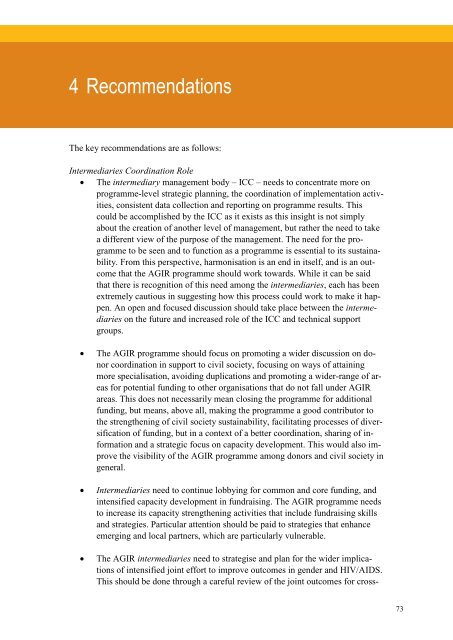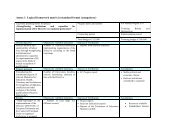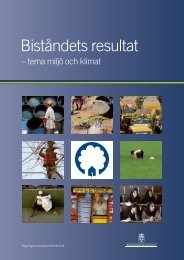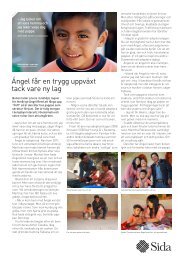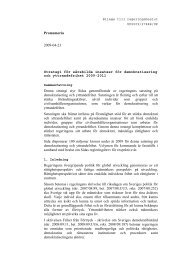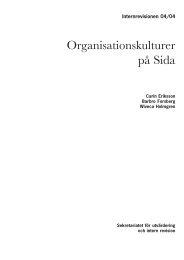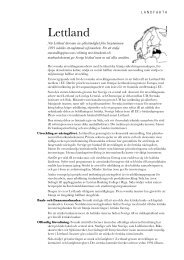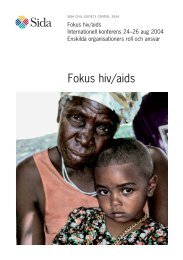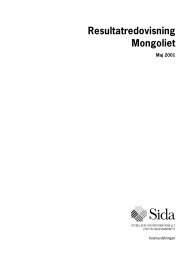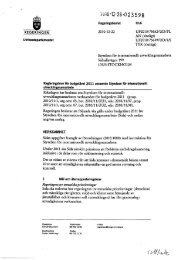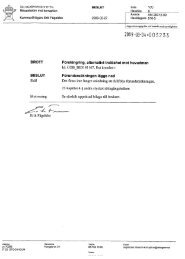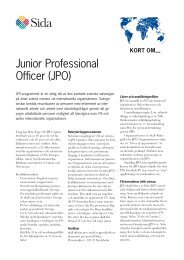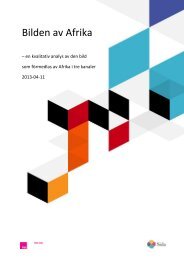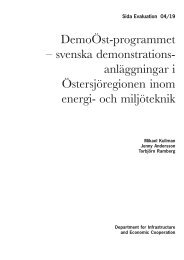Mid-Term Review of the AGIR Programme - Sida
Mid-Term Review of the AGIR Programme - Sida
Mid-Term Review of the AGIR Programme - Sida
You also want an ePaper? Increase the reach of your titles
YUMPU automatically turns print PDFs into web optimized ePapers that Google loves.
2 findings<br />
4 Recommendations<br />
The key recommendations are as follows:<br />
Intermediaries Coordination Role<br />
The intermediary management body – ICC – needs to concentrate more on<br />
programme-level strategic planning, <strong>the</strong> coordination <strong>of</strong> implementation activities,<br />
consistent data collection and reporting on programme results. This<br />
could be accomplished by <strong>the</strong> ICC as it exists as this insight is not simply<br />
about <strong>the</strong> creation <strong>of</strong> ano<strong>the</strong>r level <strong>of</strong> management, but ra<strong>the</strong>r <strong>the</strong> need to take<br />
a different view <strong>of</strong> <strong>the</strong> purpose <strong>of</strong> <strong>the</strong> management. The need for <strong>the</strong> programme<br />
to be seen and to function as a programme is essential to its sustainability.<br />
From this perspective, harmonisation is an end in itself, and is an outcome<br />
that <strong>the</strong> <strong>AGIR</strong> programme should work towards. While it can be said<br />
that <strong>the</strong>re is recognition <strong>of</strong> this need among <strong>the</strong> intermediaries, each has been<br />
extremely cautious in suggesting how this process could work to make it happen.<br />
An open and focused discussion should take place between <strong>the</strong> intermediaries<br />
on <strong>the</strong> future and increased role <strong>of</strong> <strong>the</strong> ICC and technical support<br />
groups.<br />
The <strong>AGIR</strong> programme should focus on promoting a wider discussion on donor<br />
coordination in support to civil society, focusing on ways <strong>of</strong> attaining<br />
more specialisation, avoiding duplications and promoting a wider-range <strong>of</strong> areas<br />
for potential funding to o<strong>the</strong>r organisations that do not fall under <strong>AGIR</strong><br />
areas. This does not necessarily mean closing <strong>the</strong> programme for additional<br />
funding, but means, above all, making <strong>the</strong> programme a good contributor to<br />
<strong>the</strong> streng<strong>the</strong>ning <strong>of</strong> civil society sustainability, facilitating processes <strong>of</strong> diversification<br />
<strong>of</strong> funding, but in a context <strong>of</strong> a better coordination, sharing <strong>of</strong> information<br />
and a strategic focus on capacity development. This would also improve<br />
<strong>the</strong> visibility <strong>of</strong> <strong>the</strong> <strong>AGIR</strong> programme among donors and civil society in<br />
general.<br />
Intermediaries need to continue lobbying for common and core funding, and<br />
intensified capacity development in fundraising. The <strong>AGIR</strong> programme needs<br />
to increase its capacity streng<strong>the</strong>ning activities that include fundraising skills<br />
and strategies. Particular attention should be paid to strategies that enhance<br />
emerging and local partners, which are particularly vulnerable.<br />
The <strong>AGIR</strong> intermediaries need to strategise and plan for <strong>the</strong> wider implications<br />
<strong>of</strong> intensified joint effort to improve outcomes in gender and HIV/AIDS.<br />
This should be done through a careful review <strong>of</strong> <strong>the</strong> joint outcomes for cross-<br />
73


